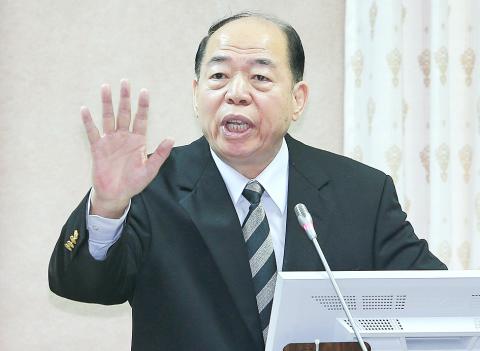The nation’s high-tech sector is under serious threat of industrial espionage as Chinese intelligence operatives target local companies for infiltration and collection of proprietary information, National Security Bureau (NSB) Director-General Yang Kuo-chiang (楊國強) told legislators yesterday.
Yang made the remarks during a question-and-answer session at a meeting of the legislature’s Foreign Affairs and National Defense Committee meeting.
New Power Party Legislator Freddy Lim (林昶佐) said he has grave concerns over Chinese espionage operations, because there have been numerous cases involving Chinese spies luring members of the nation’s armed forces into leaking classified military information.

Photo: CNA
“In addition to our military, which Taiwanese industries have been most seriously affected by Chinese spy infiltration?” Lim asked. “I would like to know, because I want these businesses to be alert to this danger so they can be more careful when hiring new workers.”
Yang said that the semiconductor and other tech sectors are the most likely targets.
Lim said that these sectors are key to the nation’s economy, and “yet President Ma Ying-jeou (馬英九) wants to open up the nation’s technology sector for investment by Chinese business. This is just absurd.”
Democratic Progressive Party (DPP) Legislator Wang Ting-yu (王定宇) said that Yang and the bureau should block bids by Chinese investors and companies to buy out Taiwanese tech businesses.
Wang was referring to the Investment Commission, which is tasked with the review, assessment and monitoring of foreign investment, and where the bureau has a representative seat.
He said the semiconductor sector is a pillar of the nation’s economy and the bureau should veto investment applications from China.
“Taiwan is a leader in IC design and we must not allow know-how and proprietary technology to be taken over by China. It is well-known that most large Chinese businesses are backed by financial capital from the Chinese government,” Wang said.
“So this is a national security issue and a serious threat to Taiwan’s economic development. Therefore, the NSB must not permit Chinese investment in the IC sector,” he added.
DPP Legislator Chiu Chih-wei (邱志偉) also asked Yang about the potential impact on cross-strait ties if China is not satisfied with president-elect Tsai Ing-wen’s (蔡英文) inauguration speech on May 20.
Yang said Beijing might shut down existing negotiation channels, prohibit Chinese tourists from visiting Taiwan, or take diplomatic action if it is unhappy with Tsai’s speech, Yang said.
The president would have to work with other senior government officials to make a response should China take any of the above three actions against Taiwan, Yang said.
Additional reporting by CNA

‘TAIWAN-FRIENDLY’: The last time the Web site fact sheet removed the lines on the US not supporting Taiwanese independence was during the Biden administration in 2022 The US Department of State has removed a statement on its Web site that it does not support Taiwanese independence, among changes that the Taiwanese government praised yesterday as supporting Taiwan. The Taiwan-US relations fact sheet, produced by the department’s Bureau of East Asian and Pacific Affairs, previously stated that the US opposes “any unilateral changes to the status quo from either side; we do not support Taiwan independence; and we expect cross-strait differences to be resolved by peaceful means.” In the updated version published on Thursday, the line stating that the US does not support Taiwanese independence had been removed. The updated

‘CORRECT IDENTIFICATION’: Beginning in May, Taiwanese married to Japanese can register their home country as Taiwan in their spouse’s family record, ‘Nikkei Asia’ said The government yesterday thanked Japan for revising rules that would allow Taiwanese nationals married to Japanese citizens to list their home country as “Taiwan” in the official family record database. At present, Taiwanese have to select “China.” Minister of Foreign Affairs Lin Chia-lung (林佳龍) said the new rule, set to be implemented in May, would now “correctly” identify Taiwanese in Japan and help protect their rights, the Ministry of Foreign Affairs said in a statement. The statement was released after Nikkei Asia reported the new policy earlier yesterday. The name and nationality of a non-Japanese person marrying a Japanese national is added to the

AT RISK: The council reiterated that people should seriously consider the necessity of visiting China, after Beijing passed 22 guidelines to punish ‘die-hard’ separatists The Mainland Affairs Council (MAC) has since Jan. 1 last year received 65 petitions regarding Taiwanese who were interrogated or detained in China, MAC Minister Chiu Chui-cheng (邱垂正) said yesterday. Fifty-two either went missing or had their personal freedoms restricted, with some put in criminal detention, while 13 were interrogated and temporarily detained, he said in a radio interview. On June 21 last year, China announced 22 guidelines to punish “die-hard Taiwanese independence separatists,” allowing Chinese courts to try people in absentia. The guidelines are uncivilized and inhumane, allowing Beijing to seize assets and issue the death penalty, with no regard for potential

‘UNITED FRONT’ FRONTS: Barring contact with Huaqiao and Jinan universities is needed to stop China targeting Taiwanese students, the education minister said Taiwan has blacklisted two Chinese universities from conducting academic exchange programs in the nation after reports that the institutes are arms of Beijing’s United Front Work Department, Minister of Education Cheng Ying-yao (鄭英耀) said in an exclusive interview with the Chinese-language Liberty Times (the Taipei Times’ sister paper) published yesterday. China’s Huaqiao University in Xiamen and Quanzhou, as well as Jinan University in Guangzhou, which have 600 and 1,500 Taiwanese on their rolls respectively, are under direct control of the Chinese government’s political warfare branch, Cheng said, citing reports by national security officials. A comprehensive ban on Taiwanese institutions collaborating or